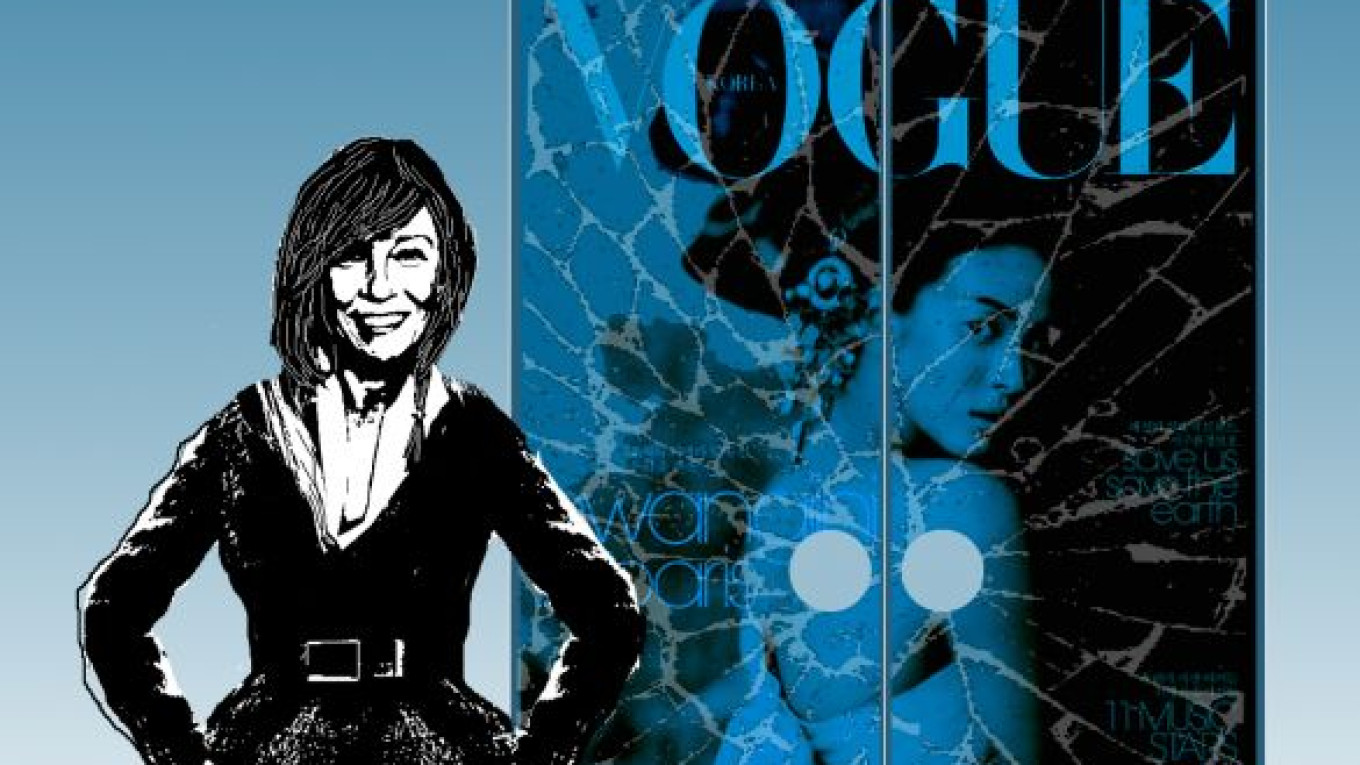At the end of last month, the shocking news that veteran Vogue editor Alyona Doletskaya was leaving even made news bulletins, a testament to the reputation she has built up over more than a decade at the helm. Later, the news came that former Tatler editor Viktoria Davydova had been appointed in her place.
Intriguingly, Russia’s second-best-known fashion editor, Evelina Khromchenko, was ignominiously sacked from her post at L’Officiel in May, and an obvious solution would have been to appoint her — she also co-hosts Channel One makeover show “Fashion Sentence” — in Doletskaya’s place.
But that does not seem to have ever been in the cards.
Doletskaya, 55, speaks fluent English and comes across as a foreigner in Russia, with her minimal makeup, simple clothes and general air of not trying too hard. She started as Vogue editor in 1998, back when the idea that Russian women en masse would buy glossy women’s magazines seemed pretty unlikely. She had long wanted to leave to start a new life and possibly write a book, Conde Nast president Jonathan Newhouse said in a statement, adding that he had asked her to wait until the economic situation started to recover.
However, catty gossip columnist Bozhena Rynska wrote in Gazeta.ru that things were not quite that way. She ridiculed the idea that Doletskaya is working on a project that she could not combine with editing, suggesting that she was planning to write a weighty tome titled “War and Vogue.”
“In place of Alyona they put a dull, manageable person,” Rynska wrote.
Doletskaya came in to work to find a message about her dismissal on the office e-mail system, one rumor has it, Rynska wrote. Another rumor says Doletskaya was phoned from head office and given two hours to gather up her belongings. “If you didn’t know that Doletskaya behaved that way with a lot of people, you could feel sorry for her,” Rynska wrote.
Her replacement is not a well-known face and thus looks likely to get on with the business of editing the magazine, Rynska wrote, sneering that “Russian glossy magazines have taken a turn toward faceless, nameless people who have no sense of language.”
Tatler is an entertaining read, even if it is not too fussy about writing about such questionable figures as Gulnara Karimova, daughter of Uzbek leader Islam Karimov, or Mehriban Aliyeva, wife of Azeri President Ilham Aliyev, in outrageously flattering terms.
Tatler is a “toothless hypocrite,” Rynska wrote, saying the magazine sucks up to the rich people it writes about, glossing over exactly how they acquired their millions.
This month’s issue has the wife of a property developer describing her daughter’s fifth birthday: a ball with her daughter sitting on a throne dressed like a princess. And there is “socialite” Lala Golovkova (most women in Tatler do not have jobs), who poses in her house under a ludicrously huge chandelier, holding a tiny, white dog.
The issue is intriguing because it has an account of Khromchenko’s sacking, blaming L’Officiel’s publisher Yevgeny Zmiyevets, who appointed his ex-model wife in an open act of nepotism. It mocks his surname, which sounds like the Russian word for “snake.”
It certainly has more bite than Vogue, however.
Russian Vogue is not one of those magazines where people urge you to read an article they saw there. But then again, I doubt that any of the Vogue editions are. It has impossibly beautiful models, clothes that cost thousands of dollars and only suit very skinny, tall people and plenty of translated material from other Vogue editions.
This month’s letter from the editor takes up not one, but two pages and makes sure that we are aware of Doletskaya’s frequent trips to France and her fluent French and English. The magazine’s theme is French women, cue all those cliches about how insouciant and effortlessly stylish they are.
Doletskaya goes on to interview Jean-Paul Gaultier, and they are chummily using the “tu” form, according to the Russian translation.
Doletskaya is visible in the photographs — a sign of an enlarged journalistic ego — hugs Gaultier and waves a cigarette around. “In Russia, pretentiousness is a terrible problem. Don’t you think?” is one of her questions.
“If you take out Alyona the wonderful, what’s left is that Vogue is an openly boring magazine,” Rynska wrote.
A Message from The Moscow Times:
Dear readers,
We are facing unprecedented challenges. Russia's Prosecutor General's Office has designated The Moscow Times as an "undesirable" organization, criminalizing our work and putting our staff at risk of prosecution. This follows our earlier unjust labeling as a "foreign agent."
These actions are direct attempts to silence independent journalism in Russia. The authorities claim our work "discredits the decisions of the Russian leadership." We see things differently: we strive to provide accurate, unbiased reporting on Russia.
We, the journalists of The Moscow Times, refuse to be silenced. But to continue our work, we need your help.
Your support, no matter how small, makes a world of difference. If you can, please support us monthly starting from just $2. It's quick to set up, and every contribution makes a significant impact.
By supporting The Moscow Times, you're defending open, independent journalism in the face of repression. Thank you for standing with us.
Remind me later.


